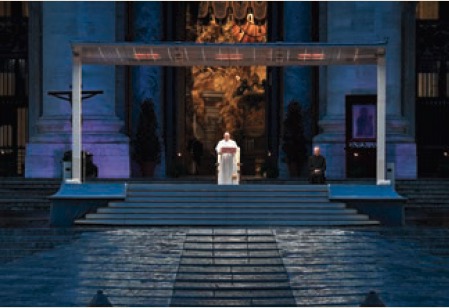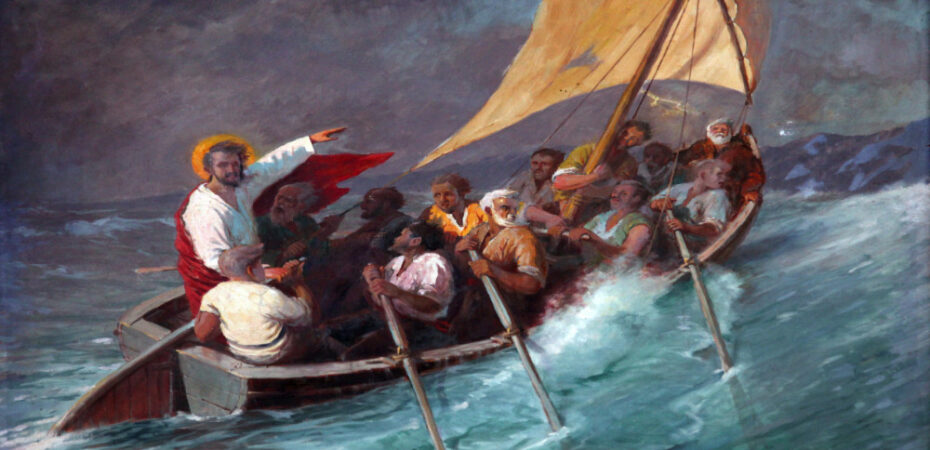The Deacon and Authentic Faith
How deacons can offer profound witness to families in troubled times
Deacon Ralph Poyo Comments Off on The Deacon and Authentic Faith
Editor’s note: Scripture references in this article are taken from the New Revised Standard Version translation of the Bible.
If there has ever been a time when the light of the Church’s faith could shine and benefit the world, it is today. There is so much fear, doubt and uncertainty that has gripped not only the world but also many in the Church. Many of the faithful are looking to God and his Church for signs of hope and security.
As deacons in the Catholic Church, we have a unique opportunity to give profound witness to the faithful who may be worried about their families and the days to come. They look to us, as ordained ministers of the Church, and who have families just like them. Parishioners are watching us, wondering how to react to the current medical and political situations of our day, searching for coves of refuge from the raging storms. And they are looking for more than comfort; they are looking for the safety of authentic faith.
Regardless of our marital status, we, ordained to serve in the Church, are now being called to rise and serve in one of the most profound ways: to give witness to rock-solid faith in Jesus Christ. The kind of faith that makes others question why you are not afraid of illness or political corruption, which threatens to change our lives or even take our lives. It is faith that is filled with conviction that Jesus did rise from the dead and truly is the Lord of both life and death.
It is a faith that lives the fullness of baptism that, when fully embraced, dies with Christ and rests totally on the goodness and provision of God for all things. A faith that has ceased to try to save oneself because we have already been saved by Christ. If this is true, then our lives belong completely to Jesus.
Deacons can rise and live the fullness of this conviction and encourage the faithful to follow us. We can show them how to do this, with families or without. The point is that we can show them!
The Example of Stephen
My thoughts now wander to the Acts of the Apostles, to Stephen who was one of the first deacons selected by the community. The apostles charged the community to identify seven men who “were full of the Spirit and of wisdom” (6:3). When they finished their discernment, “they chose Stephen, a man full of faith and the Holy Spirit” (6:5).
Stephen spoke boldly and exhibited signs and wonders because he was filled with the Holy Spirit. He allowed the Spirit to flow through him, and the religious leaders could not contend with the wisdom he shared. Stephen exercised the fullness of his baptism because he no longer lived for himself, but for God. That point would later be proven to all of us. With the words provided to him by the Holy Spirit, Stephen spoke the truth boldly to the elders and was blessed to see his reward before the stones began flying at him.
“When they heard these things, they became enraged and ground their teeth at Stephen. But filled with the Holy Spirit, he gazed into heaven and saw the glory of God and Jesus standing at the right hand of God. ‘Look,’ he said, ‘I see the heavens opened and the Son of Man standing at the right hand of God!’ But they covered their ears, and with a loud shout all rushed together against him. Then they dragged him out of the city and began to stone him” (Acts 7:54-58).
What is it that our deacon patriarch had that enabled him to stand and give witness of the truth of Jesus Christ? What enabled him to push through the fear that would tempt us to cower down and become silent? It was Stephen who rose and gave witness to the Jews and hope to the rest of the believers who were then hunted down by Saul.
Why Do We Fear?
Brothers, Jesus exhorted the apostles to remember that he is with us always. At the Great Commission, he said, “And remember, I am with you always, to the end of the age” (Mt 28:20). But many of us are tempted to live as though Jesus is not here, or we forget that he is here with us because we are so focused on the circumstances of our lives. If his promise is true, then why do we fear?
Remember the Lord’s question when he was with them on the boat? Let us remember together the apostles’ situation and that question.
“On that day, when evening had come, he said to them, ‘Let us go across to the other side.’ And leaving the crowd behind, they took him with them in the boat, just as he was. Other boats were with him. A great windstorm arose, and the waves beat into the boat, so that the boat was already being swamped. But he was in the stern, asleep on the cushion; and they woke him up and said to him, ‘Teacher, do you not care that we are perishing?’ And waking up, he rebuked the wind, and said to the sea, ‘Be silent! Be still!’ Then the wind ceased, and there was a dead calm. He said to them, ‘Why are you afraid? Have you still no faith?’ And they were filled with great awe and said to one another, ‘Who then is this, that even the wind and the sea obey him?’” (Mk 4:35-41).
On this particular day, Jesus wanted to deal with one particular question as he took his apostles out on the boat. So, the Lord allowed the storms to come and the waves to breach the gunwalel and fill the boat. The question dealt with the apostles’ faith and who they believed Jesus to be.
As we look at the text above, we can see that the apostles were concerned. Many, having spent much of their lives on the sea, understood the natural laws surrounding squalls and storms at sea. They understood that people could easily die under these circumstances. Their fears were not unwarranted.
However, there was one critical difference. This time, Jesus was with them in the boat. I suspect they were astounded that Jesus would be asleep during such a life-threatening storm. Up to this point in Mark’s Gospel, the apostles had seen Jesus perform some miracles of healing, but this was different. This situation had to do with the winds and the waves that were affected by the storm.
Notice the Lord’s response when they woke him up. With the authority that can only come from the creator God, Jesus commanded the wind and the sea to be calm. Then Jesus presented them with the question he wanted to deal with: “Why are you afraid?” (v. 40). He was alluding to the fact that he was right there with them in the boat. Did the apostles think that Jesus would allow them to die right there? Or did they believe that Jesus didn’t have the power to control the wind and the waves? Or was it both?
Certainly, the end of the passage reveals the apostles’ level of understanding as they questioned, “Who then is this, that even the wind and the sea obey him?” (v. 41). The answer to this question is pivotal to the Gospel we as deacons preach. Do we believe (“be-living”) that Jesus Christ is God and has supernatural power “because” he created natural law, or do we see him as one of us with limits?
Have You Still No Faith?
The final question the Lord challenges the apostles and us with is, “Have you still no faith?” (Mk 35:40). While the rest of the world cowers in fear over the recent medical, political and spiritual storms embroiling them, how are we responding? What does it mean that Jesus rose from the dead? Are we applying the true meaning of that fact to our own lives, thus living in faith that Jesus really will take care of us? Do we believe in his promise at the conclusion of Matthew’s Gospel that he will be with us always and, therefore, will take care of us always?
My brother deacons, the Church is not in the information dissemination business, but the “faith” dissemination business. What is the value of learning the entire word of God if, in the end, we don’t entrust our lives to God?
Of course, we catechize, but for what end — the attainment of knowledge of the restoration of authentic faith. A faith that does not remove the fear but emboldens us to move through it.
Let us cry out to God for the graces we need to live these truths, paying close attention not to our feelings of fear and anxiety, but the fruits of the Spirit, “because” he is with us always.
DEACON RALPH POYO is the founder of New Evangelization Ministries
…………………………………………………………………………………………………………………………………………………
Pope Francis on the Storm

Newscom
On March 27, 2020, Pope Francis, in his extraordinary urbi et orbi (to the city and the world) blessing, spoke of the fear of perishing in the storm: “The storm exposes our vulnerability and uncovers those false and superfluous certainties around which we have constructed our daily schedules, our projects, our habits and priorities. It shows us how we have allowed to become dull and feeble the very things that nourish, sustain and strengthen our lives and our communities. The tempest lays bare all our prepackaged ideas and forgetfulness of what nourishes our people’s souls; all those attempts that anesthetize us with ways of thinking and acting that supposedly ‘save’ us, but instead prove incapable of putting us in touch with our roots and keeping alive the memory of those who have gone before us. We deprive ourselves of the antibodies we need to confront adversity.
“In this storm, the façade of those stereotypes with which we camouflaged our egos, always worrying about our image, has fallen away, uncovering once more that (blessed) common belonging, of which we cannot be deprived: our belonging as brothers and sisters.”
…………………………………………………………………………………………………………………………………………………





